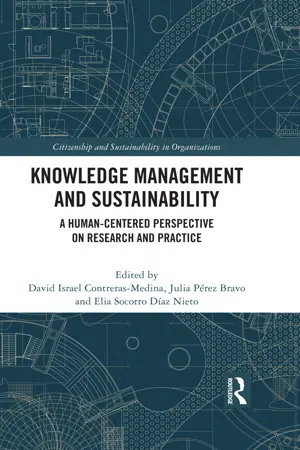
Knowledge Management and Sustainability
A Human-Centered Perspective on Research and Practice
- 192 pages
- English
- ePUB (mobile friendly)
- Available on iOS & Android
Knowledge Management and Sustainability
A Human-Centered Perspective on Research and Practice
About this book
Based on the importance of human beings as creators and managers of knowledge towards the achievement of sustainability in the current digital age, this book is an effort to present many studies taking individuals as centers of knowledge and starting points for environmental, social, and economic development.
From various theoretical and empirical studies developed by researchers from Mexico, Colombia, and Brazil, this book presents, in an ordered sequence, the individual as the creator of knowledge, the role of human beings as knowledge managers with and for sustainability, the opportunities for knowledge sharing in virtual research collaborations for sustainability, and the advantages and disadvantages with and for sustainability from a human-centered perspective in the digital era. Moreover, this text describes the antecedents of competitive advantage in a sustainable cooperative network, knowledge management in technology projects, an empirical study of knowledge management of tutorial intervention, a model of processes and knowledge management to increase competitiveness, the role of Information and Communication Technologies (ICT) for managing sustainable practices, finishing with knowledge management trends with and for sustainability, from a human-centered perspective in the digital era.
Offering an innovative approach, this book seeks to expand the understanding of the theme of knowledge management and sustainability from the perspective of the human resource as a generator of knowledge. There is mounting focus on knowledge-intensive work and sustainable development in the corporate world. In light of these trends, this edited volume will be of value to researchers, academics, professionals, and advanced students in the fields of management, environment and sustainability, and development studies.
Frequently asked questions
- Essential is ideal for learners and professionals who enjoy exploring a wide range of subjects. Access the Essential Library with 800,000+ trusted titles and best-sellers across business, personal growth, and the humanities. Includes unlimited reading time and Standard Read Aloud voice.
- Complete: Perfect for advanced learners and researchers needing full, unrestricted access. Unlock 1.4M+ books across hundreds of subjects, including academic and specialized titles. The Complete Plan also includes advanced features like Premium Read Aloud and Research Assistant.
Please note we cannot support devices running on iOS 13 and Android 7 or earlier. Learn more about using the app.
Information
1The Individual as Creator of KnowledgeConstructivist Model in the University, a Theoretical Approach
Introduction
Methodology
Developing
Theoretical Arguments: The Creation and Management of Knowledge
[…] Knowledge has become one of the most important assets for organizations because its management adds value to its products or services and allows the development of technologies, methodologies, and strategies, which facilitates their insertion and consolidation in the market.(p. 1)
Constructivism as a Model of Learning
The New Competencies and the Project Based Learning Method ̶ PBLM
Table of contents
- Cover
- Half-Title Page
- Series Page
- Title Page
- Copyright Page
- Dedication
- Contents
- List of Figures
- List of Tables
- List of Contributors
- Preface
- 1 The Individual as Creator of Knowledge: Constructivist Model in the University, a Theoretical Approach
- 2 The Role of Human Beings as Knowledge Managers with and for Sustainability in the Digital Age
- 3 Exploring Formal Opportunities for Knowledge Sharing in Virtual Research Collaborations for Sustainability
- 4 Knowledge Management: Advantages and Disadvantages with and for Sustainability from a Human-Centered Perspective in the Digital Era
- 5 Antecedents of Competitive Advantage in a Sustainable Cooperative Network
- 6 Knowledge Management in Technology Projects in Technological Development Centers with an Impact on Society in Querétaro
- 7 Empirical Study of Knowledge Management of Tutorial Intervention with a Human Perspective for Social Development
- 8 Model of Processes and Knowledge Management to Increase Competitiveness
- 9 The Role of Information and Communication Technologies (ICT) for Managing Sustainable Agricultural Practices: The Case of the Agricultural Extension Services in Colombia
- 10 Knowledge Management Trends with and for Sustainability from a Human-Centered Perspective in the Digital Era
- Index